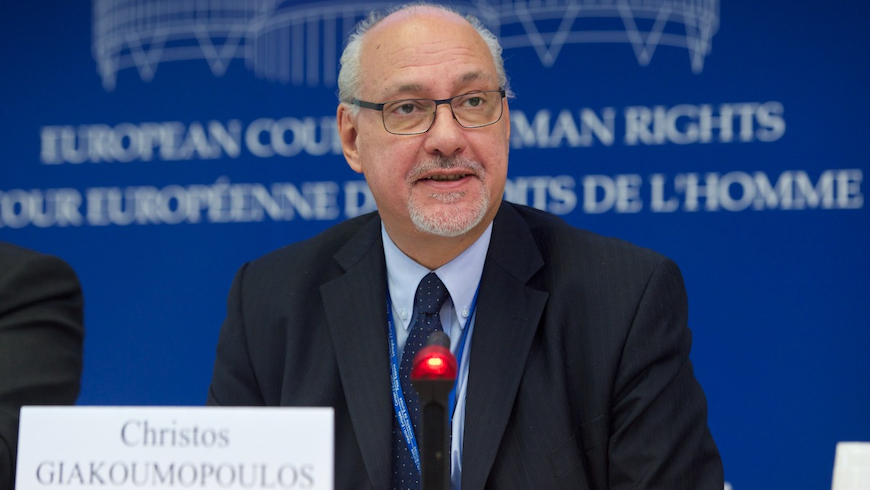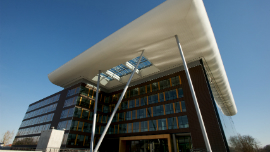Annual Speech by Christos Giakoumopoulos
European Union Agency for Fundamental Rights (FRA) 35th Management Board
11 December 2020, online
Dear Madam Chair,
Dear members of the Management Board,
Dear Director, dear Colleagues and friends,
As much as I would have preferred to sit around a table with you in Vienna, it is a great pleasure to be addressing you at the 35th FRA Management Board. One cannot say that the last twelve months since we last met have been smooth. What we have regarded as “normal life” was put on hold with the COVID-19 pandemic, with all the serious repercussions that this has had on the enjoyment of human rights. Terrorism has hit at the very heart of Europe, both in France and Vienna, and – for the CoE - we had a very violent war in the South Caucasus.
These challenges are precisely the reason why it is important for there to be a common response, ensuring that human rights are protected throughout our continent. And who is better placed than the Council of Europe and FRA to do this together, joining forces in the face of adversity and with hope?
I will not repeat what you have read in the detailed report on the cooperation between FRA and the Council of Europe in 2020, but allow me to highlight a few milestones, which have been important for the Council of Europe.
After the mandate of Rainer Hofmann and Luis Quesada Jimenez ended, on 1 July, our Committee of Ministers elected their successors as Council of Europe Independent Person and alternate to FRA’s Management and Executive Boards.
Some of you have already met – virtually – the new tandem, Philippe Boillat and Lawrence Early. Philippe was my predecessor as Director General of Human Rights and Rule of Law at the Council of Europe, while Lawrence was the Jurisconsult at the European Court of Human Rights. They are both some of the best human rights experts in Europe and it is great that they can now lend their experience to FRA. I am also delighted that Philippe is a member of AREDIT.
In connection with institutional cooperation, I am also very glad that one of the last face-to-face meetings before the first lockdown was the first one between our Secretary General, Marija Pejčinović Burić, and the Director of FRA, Michael, who travelled to Strasbourg on 4 March. This mission was also an opportunity for Michael to meet with the Human Rights Commissioner, Dunja Mijatović, representatives of my Directorate General and of DG Democracy, as well as of PACE.
The Secretary General and FRA Director praised the excellent relationship between the Council of Europe and the agency, recalling its birth in a context of concern for duplication and agreed that the co-operation is complementary and collegial. I had the opportunity to underline the same message in a meeting of the Political Affairs’ Committee of PACE yesterday when the “CoE-EU relation” was discussed.
The meeting was also a good opportunity to recall that FRA does not conduct monitoring, and that it relies on CoE standards exclusively in the course of its work on the ground. FRA’s main aim is to make sure that human rights are really embedded in EU policies. Mr O’Flaherty underlined the close working relations which happen on a day to day basis are key to our successful cooperation. Thank you, Michael!!
One important development this year has been the first Annual Rule of Law Report prepared by the European Commission, to which both the Council of Europe and FRA contributed. As a result, the report contains extensive references to our findings, in particular, the Venice Commission Opinions and GRECO recommendations.
FRA’s efforts in triggering a national dialogue after the publication of the report to make it more visible at national level is a VERY welcome initiative. These joint efforts support countries in making the necessary reforms on the basis of commonly agreed standards, notwithstanding that a few EU member states continue to be recalcitrant in implementing both EU and CoE recommendations. This is a good example of our complementarity. The report is also an important document – a comprehensive needs assessment – that allows the CoE – together with DG reform – to provide more targeted tailored assistance to MS.
Let me come to the COVID: The Secretary General stated that while the Covid-19 pandemic is resulting in the loss of lives, we must nonetheless prevent it from destroying our way of life and the rights and freedoms to which every European and person under Europe’s jurisdiction is entitled. The coordination of States’ response and the exchange of best practices have been at the forefront of efforts by the Council of Europe and FRA in this period.
The Secretary General of the Council of Europe has issued a number of guidance documents on the impact of the COVID-19 pandemic, notably on human rights and the rule of law, the right to health, and freedom of expression. FRA’s work was particularly mentioned in the report ‘Digital Solution to fight COVID-19’.
Let me also mention that in March, FRA and the Secretary General’s Special Representative on Migration and Refugees, Drahoslav Štefánek, jointly published a paper on the Fundamental Rights of refugees, asylum applicants and migrants at the European borders, covering special measures imposed in case of a pandemic. Other exchanges between Strasbourg and Vienna related to the impact of the pandemic on racial discrimination and the rights of the child.
Colleagues in the Secretariat particularly valued the periodic bulletins FRA prepared on the impact of the pandemic on the enjoyment of fundamental rights. I hope that DGI and DGII’s newsletters were useful to FRA as well. The crisis is not over. Even if we see a glimpse of hope with the development of vaccines which should be available in the near future, the Covid crisis will have a long-lasting effect on European societies.
Preserving social rights and preventing the further spread of poverty is certainly something that will require the full attention of the Council of Europe and FRA. Social Rights are among the cooperation priorities of the EU with the CoE, as defined in a document adopted by the Council before the summer break. We feel that there is a huge potential of co-operation in this field and DG I made recently a contribution in the framework of the consultation launched by the Commission on the implementation of the Pillar of Social Rights. Housing and the fight against poverty (here I join what Michal O’Flaherty was stressing earlier) is an area we feel the Social Rights Pillar should look into as a matter of priority. This is a human rights issue but also an issue of democratic stability.
Another lasting challenge is Europe’s response to migration. The launch of the Pact on Migration by the Commission is an important milestone. It is crucial that FRA and the Council of Europe find their respective place, in accordance with their respective mandates, in its further adoption and implementation. The risks posed by potential human rights violations are too high for us not to work together to alleviate them, as at the end it puts in danger not only the credibility of the Pact, but all those involved in its implementation, ultimately the EU as a whole.
Looking to the future, I will not elaborate on all the chantiers on which the Council of Europe and FRA will be working together, notably through FRA’s participation as an observer in our intergovernmental committees entrusted with the development of new standards. For that, I refer to you to the report on cooperation that I have already mentioned.
Migration detention, Artificial Intelligence, business and Human rights, the protection of the environment and its link to HR, the deteriorating climate of freedom of expression in Europe are some of the issues we will be discussing next year and where FRA will participate. What I would like to put the spotlight on is the 2021 Fundamental Rights Forum. I look forward to our participation in the event itself and also to its conceptualisation. Indeed, the Forum is a unique event placing human rights at the centre stage, with the aim to come up with ideas and solutions to face current challenges and shape a rights-based future. Thus, it contributes to building a vision of hope, like its counterpart, the World Forum for Democracy. Before I conclude, I would like to give you a quick update on the negotiations on the accession of the EU to the ECHR, because ultimately, this will also have an impact on FRA. As you know, these negotiations have recommenced at the request of the European Commission and the responsible negotiation group within the Council of Europe has – despite the pandemic crisis – already held three meetings in 2020. EU Accession remains more important than ever to close the existing gaps in the European human rights architecture.
The problems which need to be addressed are complex and difficult, but not insurmountable. Both the Council of Europe 47 member states and the EU are committed to success as the current negotiations may well be the last chance to seize to succeed in this important mission. Finally, an important milestone for FRA will be the revision of its Founding Regulation, to have its competencies aligned with those of the EU after the Lisbon Treaty.
I very much hope that the negotiations with the EU member states will go in the right direction to achieve unanimity, as this will certainly simplify your work to have a mandate in line with reality. In the PACE yesterday, I underlined that bringing the Fundamental Regulation in line with Lisbon Treaty is something the CoE expects, as it is – to put it simple – the natural thing to do ! Thank you very much for your attention.




